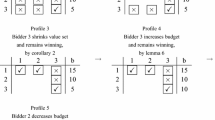Abstract
In this paper, we focus on the domain of decreasing marginal valuations and show that in the presence of budget-constrained bidders there is no multi-unit auction that satisfies the following four properties: incentive compatibility, Pareto optimality, individual rationality and no positive transfers. This result strengthens the impossibility results of two previous studies.
Similar content being viewed by others
Notes
Other contributions to this literature include those by Fiat et al. (2011) and Le (2017). Under the condition of bidders’ budgets being public information, Fiat et al. (2011) extends the result of Dobzinski et al. (2012) to single-valued combinatorial auctions and show that there is no combinatorial auction with two items and two bidders that satisfies the above-mentioned four properties. Under the condition of bidders’ budgets being private information, Le (2017) prove that there is no auction defined on the general domain that is incentive compatible, individually rational, symmetric, non-wasteful and non-bossy.
“Theorem 2 (Milgrom and Segal 2002): Suppose that \(f\left( {x, \cdot } \right)\) is absolutely continuous for all \(x \in X\). Suppose also that there exists an integrable fttnction \(b:\left[ {0,1} \right] \to R_{ + }\) such that \(\left| {f_{t} \left( {x,t} \right)} \right| \le b\left( t \right)\) for all \(x \in X\) and almost all \(t \in \left[ {0,1} \right]\). Then \(V\) is absolutely continuous. Suppose, in addition, that \(f\left( {x, \cdot } \right)\) is differentiable for all \(x \in X\), and that \(X^{*} \left( t \right) \ne \emptyset\) almost everywhere on \(\left[ {0,1} \right]\). Then for any selection \(x^{*} \left( t \right) \in X^{*} \left( t \right)\), \(V\left( t \right) = V\left( 0 \right) + \mathop \smallint \limits_{0}^{{\text{t}}} f_{t} \left( {x^{*} \left( s \right),s} \right)ds\).”.
Here \(X\) denotes the choice set, \(f:X \times \left[ {0,1} \right] \to R\), \(V\left( t \right) = \mathop {\sup }\limits_{x \in X} f\left( {x,t} \right)\) and \(X^{*} \left( t \right) = \left\{ {x \in X:f\left( {x,t} \right) = V\left( t \right)} \right\}\).
Lemma 4 is also a corollary of Proposition 2.5 in Dobzinski et al. (2012).
Lemma 5 is proved firstly by Lavi and May (2012) for the case of \(M=2\).
\({p}_{1}\left({v}_{1},{v}_{2}\right)=0\) follows from Lemma 6(ii) and \({d}_{1}\left({v}_{1},{v}_{2}\right)=0\) follows from Lemma 4.
References
Ausubel LM (2004) An efficient ascending-bid auction for multiple objects. Am Econ Rev 94:1452–1475
Bikhchandani S, Chatterji S, Lavi R, Mualem A, Nisan N, Sen A (2006) Weak monotonicity characterizes deterministic dominant-strategy implementation. Econometrica 74:1109–1132
Dobzinski S, Lavi R, Nisan N (2012) Multi-unit auctions with budget limits. Games Econom Behav 74:486–503
Fiat, A., Leonardi, S., Saia, J., Sankowski, P., 2011. Single valued combinatorial auctions with budgets. In: Proceedings of the 12th ACM conference on electronic commerce (ACM-EC), pp 223–232.
Lavi R, May M (2012) A note on the incompatibility of strategy-proofness and Pareto-optimality in quasi-linear settings with public budgets. Econ Lett 115:100–103
Le P (2017) Mechanisms for combinatorial auctions with budget constraints. Rev Econ Design 21:1–31
Milgrom P, Segal I (2002) Envelope theorems for arbitrary choice sets. Econometrica 70(2):583–601
Sakai T (2008) Second price auctions on general preference domains: two characterizations. Econ Theor 37(2):347–356
Saks M, Yu L (2005) Weak monotonicity suffices for truthfulness on convex domains. In: Proceedings of the 6th ACM conference on electronic commerce. ACM Press, New York, pp 286–293.
Ting HF, Xiang XZ (2012) Multi-unit auctions with budgets and non-uniform valuations. In: 23rd international symposium on algorithms and computation, Taipei, Taiwan. Algorithms and computation, pp 669–678.
Yi J, Wang H, Li Y (2018) Designing efficient and incentive compatible mechanisms is almost impossible in quasi-linear environments. Econ Lett 173:113–117
Acknowledgements
We thank referees and an expert associate editor for their comments and suggestions.
Author information
Authors and Affiliations
Corresponding author
Additional information
Publisher's Note
Springer Nature remains neutral with regard to jurisdictional claims in published maps and institutional affiliations.
Rights and permissions
Springer Nature or its licensor (e.g. a society or other partner) holds exclusive rights to this article under a publishing agreement with the author(s) or other rightsholder(s); author self-archiving of the accepted manuscript version of this article is solely governed by the terms of such publishing agreement and applicable law.
About this article
Cite this article
Yi, J. A note on the impossibility of multi-unit auctions with budget-constrained bidders. Rev Econ Design (2023). https://doi.org/10.1007/s10058-023-00342-w
Received:
Accepted:
Published:
DOI: https://doi.org/10.1007/s10058-023-00342-w




